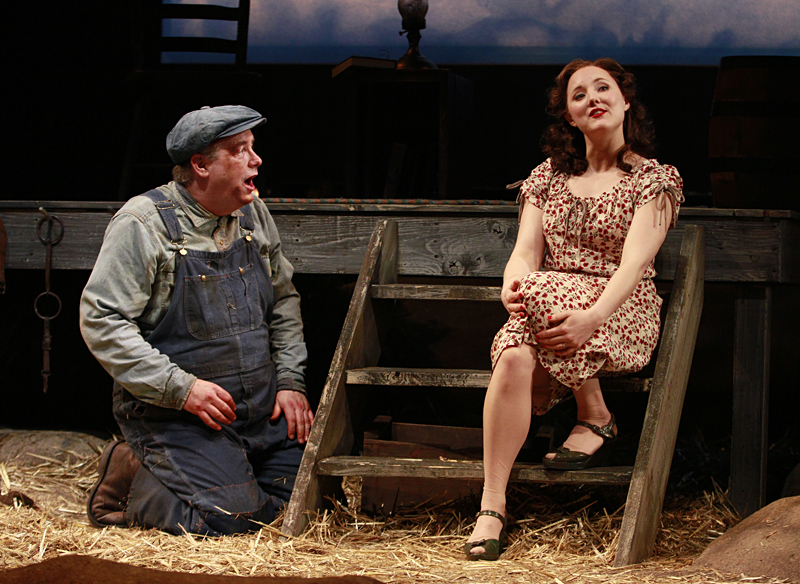An adequate production of an inadequate play, Of Mice and Men can’t escape the declining reputation of its author, John Steinbeck. He wrote the first stage adaptation the year his novella was published, 1937, two years before the famous movie starring Lon Chaney Jr. as the gentle, mentally feeble giant Lennie and Burgess Meredith as his protector, George. The book and film are important cultural touchstones of the Great Depression, when worker protections were few, solidarity lacking, and field hands dreaded the prospect of advanced age and penury, when they might as well be shot like old dogs.
When that gunshot came, offstage, some in the opening-night audience actually gasped, but it’s hard to imagine how, seven decades later, any theatergoer doesn’t know Steinbeck’s story forward and backward. There are no surprises in this staging, capably directed by Jerry Manning, apart from the excessive run time: 135 minutes, plus intermission, as compared to the 106-minute movie. An endlessly expository first scene has Lennie (Charles Leggett) and George (Troy Fischnaller) telling us everything we already know. And if you don’t get the point about the rabbits, the dream of a homestead, “living off the fat of the land,” and Lennie’s dangerous strength, don’t worry: Steinbeck’s clumsy, repetitive script hammers every point home at least two or three more times.
No more than Steinbeck’s other creations here, Lennie and George aren’t characters so much as Depression-era archetypes. The two are played with maudlin sensitivity, while the surrounding farmworkers are so many props. The best feature of the play, looming over its single set, is the movie-screen backdrop (by Jennifer Zeyl), on which the sky gradually shifts from blue to orange to purple. The best scene is that between Leggett and Elise Karolina Hunt (playing a young, frustrated farm wife), as each poor soul confesses their hopes and fears. But of course we know where that’s headed, too, just like the dogs and mice.
Perhaps the pathos will seem fresh to those unlucky schoolkids bused to the matinees, provided they haven’t read the book. And if they have, those teenage fingers could reduce it to a 140-character tweet: Big oaf loves rabbits. Smart little pal hopes to buy farm. Both dreams crushed. Nobody gets what they want. Everyone has a sad. The end.








